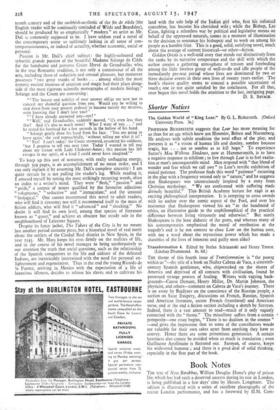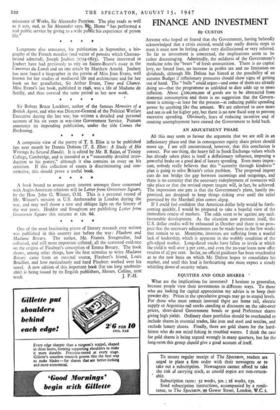Book Notes
THE text of Now Barabbas, William Douglas Home's play of prison life, which has had such a deserved success during its run in London, is being published in a few days' time by Messrs. Longmans. The edition is illustrated with a series of excellent photographs of the recent London performance, and has a foreword by H.M. Corn-
missioner of Works, Sir Alexander Paterson. The play reads as well as it acts, and, as Sir Alexander says, Home " has performed a real public service by giving to a wide pu lic his experience of prison life."
* * * *
•
Longmans also announce, for publication in September, a bio- graphy of the French moralist (and writer of pensies which Chateau- briand admired), Joseph Joubert (1754-1823). Those interested in Joubert have had previously to rely on Sainte-Beuve's essay in the Causeries du Lundi and on one article by Matthew Arnold. Joubert has now found a biographer in the person of Miss Joan Evans, well known for her studies of mediaeval life and architecture and for her book on her grandfather, Sir Arthur Evans, Time and Chance. Miss Evans's last book, published in 1946, was a life of Madame de Serilly, and thus covered the same period as her new work.
* * * *
Sir Robert Bruce Lockhart, author of the famous Memoirs of a British Agent, and who was Director-General of the Political Warfare Executive during the late war, has written a detailed and personal account of his six years in war-time Government Service. Putnam announce its impending publication, under the title Comes the Reckoning. * * * * A composite view of the poetry of T. S. Eliot is to be published late next month by Dennis Dobson (T. S. Eliot: A Study of His Writings by Several Hands). It is edited by Mr. B. Rajan, of Trinity College, Cambridge, and is intended as a " reasonably detailed intro- duction to his poetry," although it also contains an essay on his criticism. If this collection of essays is discriminating and con- structive, this should prove a useful book.
* * * *
A book bound to arouse great interest amongst those concerned with Anglo-American relations will be Letter from Grosvenor Square, by the Hon. John G. Winant, O.M. This is a personal record of Mr. Winant's mission as U.S. Ambassador in London during the war, and may well throw a new and oblique light on the history of the war years. Hodder and Stoughton are publishing Letter from _ Grosvenor Square this autumn at I2S. 6d.
* *
One of the most fascinating pieces of literary research ever written was published in this country just before the war: Flaubert and Madame Bovary. The author, M. Francis Steegmuller, had collected, and still more important collated, all the scattered evidence on the origins of Flaubert's conception of Emma Bovary. The book shows, among other things, how the first stimulus to write Madame Bovary came from an external source, Flaubert's friend, Louis Bouilhet, and how meticulously and hard Flaubert worked over his novel. A new edition of this important book (for too long unobtain- able) is being issued by its English publishers, Messrs. Collins, next



































 Previous page
Previous page